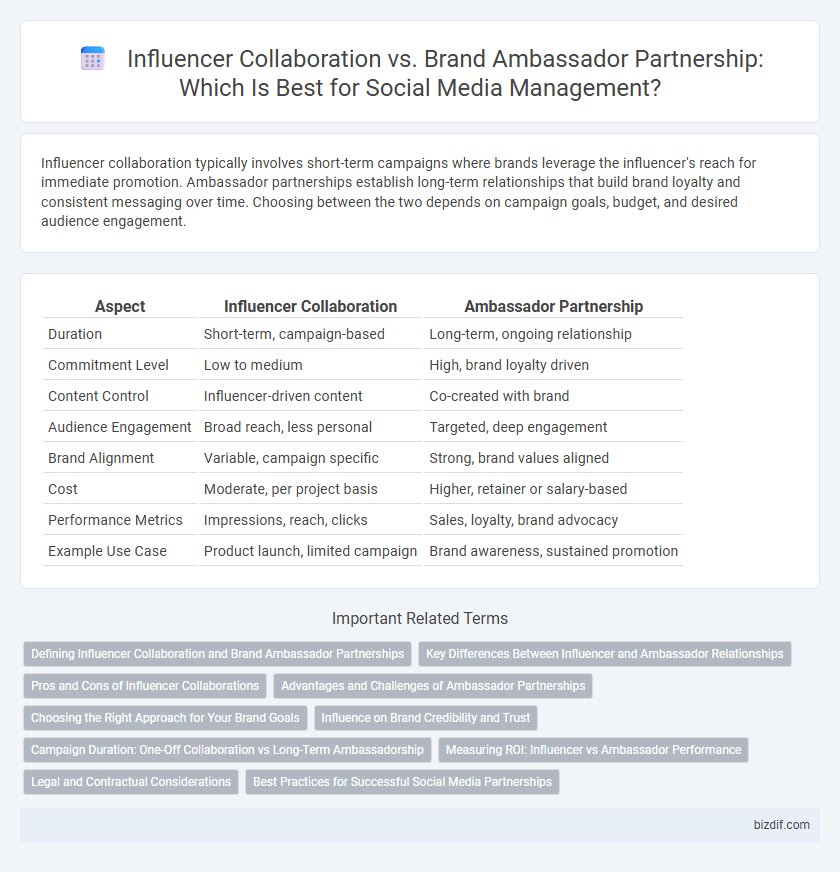Influencer collaboration typically involves short-term campaigns where brands leverage the influencer's reach for immediate promotion. Ambassador partnerships establish long-term relationships that build brand loyalty and consistent messaging over time. Choosing between the two depends on campaign goals, budget, and desired audience engagement.
Table of Comparison
| Aspect | Influencer Collaboration | Ambassador Partnership |
|---|---|---|
| Duration | Short-term, campaign-based | Long-term, ongoing relationship |
| Commitment Level | Low to medium | High, brand loyalty driven |
| Content Control | Influencer-driven content | Co-created with brand |
| Audience Engagement | Broad reach, less personal | Targeted, deep engagement |
| Brand Alignment | Variable, campaign specific | Strong, brand values aligned |
| Cost | Moderate, per project basis | Higher, retainer or salary-based |
| Performance Metrics | Impressions, reach, clicks | Sales, loyalty, brand advocacy |
| Example Use Case | Product launch, limited campaign | Brand awareness, sustained promotion |
Defining Influencer Collaboration and Brand Ambassador Partnerships
Influencer collaboration involves short-term, campaign-specific partnerships where influencers promote products or services to their audiences, focusing on immediate engagement and reach. Brand ambassador partnerships are long-term agreements designed to build authentic brand loyalty and consistent representation through ongoing content and advocacy. Both strategies leverage influencer credibility but differ in duration, commitment, and depth of brand integration.
Key Differences Between Influencer and Ambassador Relationships
Influencer collaboration typically involves short-term campaigns where influencers promote a brand to their audience for specific content or events, while ambassador partnerships are long-term relationships centered on brand loyalty and consistent representation. Influencers often have a broader and more varied audience reach with a focus on content creation, whereas ambassadors embody the brand's values and engage in ongoing promotion, sometimes participating in product development or feedback loops. The key difference lies in the depth of commitment, with ambassadors serving as trusted brand advocates and influencers primarily acting as content promoters.
Pros and Cons of Influencer Collaborations
Influencer collaborations offer swift brand exposure and the ability to tap into diverse audiences through short-term, flexible campaigns, but they often lack long-term loyalty and consistent brand representation. The transient nature of influencer partnerships can lead to varying content quality and less authentic connections compared to ambassador programs. While collaborations can generate quick engagement spikes, they may require continuous investment to maintain visibility and impact.
Advantages and Challenges of Ambassador Partnerships
Ambassador partnerships offer long-term brand loyalty and authentic representation, fostering deeper consumer trust compared to one-time influencer collaborations. These partnerships provide consistent content creation and ongoing engagement, enhancing brand visibility over time. Challenges include higher commitment requirements, potential for brand-image misalignment, and the need for continuous relationship management to maintain genuine advocacy.
Choosing the Right Approach for Your Brand Goals
Influencer collaboration offers short-term campaigns with immediate reach, ideal for product launches or seasonal promotions. Ambassador partnerships build long-term brand loyalty through ongoing engagement, suited for sustained brand awareness and trust. Selecting the right approach depends on whether your priority is rapid exposure or deep-rooted customer relationships aligned with brand values.
Influence on Brand Credibility and Trust
Influencer collaboration offers short-term exposure by leveraging the influencer's audience, boosting brand visibility and immediate trust through authentic endorsements. Ambassador partnerships create long-term relationships that deepen brand credibility by consistently reflecting the brand's values and fostering ongoing consumer trust. Both strategies enhance brand reputation, but ambassadors typically generate sustained influence and stronger consumer loyalty.
Campaign Duration: One-Off Collaboration vs Long-Term Ambassadorship
Influencer collaborations typically involve one-off campaigns designed to generate immediate brand awareness and engagement, often lasting from days to weeks. Ambassador partnerships focus on long-term relationships, spanning several months to years, fostering deeper brand loyalty and consistent audience reach. Brands leverage one-off collaborations for quick impact, while ambassadorships build sustained credibility and authentic storytelling.
Measuring ROI: Influencer vs Ambassador Performance
Measuring ROI in social media management requires comparing influencer collaboration and ambassador partnership performance through metrics like engagement rate, conversion rate, and customer lifetime value. Influencer campaigns often yield quick, measurable spikes in brand awareness and sales, while ambassador partnerships typically generate sustained brand loyalty and higher long-term lifetime value. Data-driven analysis should prioritize tracking referral codes, social media analytics, and sales attribution to accurately assess both short-term impact and ongoing influence.
Legal and Contractual Considerations
Influencer collaborations often involve short-term contracts with specific deliverables and clear guidelines on content usage, while ambassador partnerships require long-term agreements that define exclusivity, brand representation, and renewal terms. Legal considerations include copyright ownership, confidentiality clauses, and compliance with advertising standards, which must be explicitly addressed to protect both parties. Contractual clarity ensures effective risk management by outlining termination conditions, dispute resolution mechanisms, and financial obligations in influencer versus ambassador relationships.
Best Practices for Successful Social Media Partnerships
Influencer collaboration thrives on short-term campaigns leveraging diverse audiences for heightened brand visibility, while ambassador partnerships emphasize long-term relationships cultivating authentic trust and consistent brand representation. Best practices include selecting influencers whose values align closely with the brand, setting clear expectations through detailed agreements, and utilizing performance metrics like engagement rates and conversion tracking to measure ROI effectively. Regular communication and co-creating content ensure sustained audience engagement, maximizing the impact of both collaboration models in social media management.
Influencer collaboration vs Ambassador partnership Infographic

 bizdif.com
bizdif.com